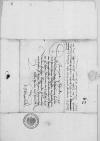Dem durchlauchtigen, hochgebornen fursten und herren, herren ⌊Albrechten⌋, von Gottes gnaden marggraffen zu ⌊Brandenburg⌋, / in ⌊Preussen⌋, / zu ⌊Stettin⌋, / ⌊Pommern⌋, / der ⌊Cassuben⌋ und ⌊Wenden⌋ hertzogen, / burggraffen zu ⌊Normberg⌋ und fursten zu ⌊Rugen⌋, / unserm hochgunstigen, lieben herren und freunde /
In furstlicher durchlaucht eigen hande /
Durchlauchter, hochgeborner furst, hochgunstiger, lieber her und freundt. / Unsere freuntliche und vleiswillige dienste zuvoran. /
Uff Euer Furstlichen Durchlaucht ⌊⌋ / in den denischen hendeln, / das uns denn ersten tagk dis monds geworden, / hab wir uns mit etlichen hern ⌊rethen dis koniglichen orts⌋ schriftlich beredt / und entschlossen, / an ⌊konigliche majestet⌋, unsern aller gnedigisten herren, / den edlen, ehrnfestenn hern ⌊dantzker castellan⌋, / der gestrigs tags bei uns gewesen, / vor dem ⌊gemeinen angesetzten reichstage der Cron⌋, / welcher (wie nach gesagt wirt) zu ⌊Peterkaw⌋ gehalten soll werden, / zufertigen, / im auch ein instruction / aus Euer Furstlichen Durchlaucht gemeltem schreiben an uns / mitgegeben / der zuvorsicht, bei hochgedachter koniglicher majestet forderlich, / auch nach Euer Furstlichen Durchlaucht willen / und diesen landen allen / und uns zu gutt, / nutzlich werde ersprissenn / etc. worinne wir uns haben Euer Furstlichen Durchlaucht zu freuntlichein dienst allenthalben unbeschwert erzeiget, / wie wir sonst auch allewegen geflissen sein befunden etc.
Mitler zeit ist uns vorkommen, wie Euer Furstliche Durchlaucht gestrenge und hart / allen iren ⌊underthanen⌋ vorbotten, / den ⌊unsern⌋ in ⌊unser landt⌋ / nichts von getreide / und speise wahr einzufuren, / welchs wir gedencken, / auch zuvor etlich jar her der gestalt gescheenn, / derwegen wir auch Euer Furstlichen Durchlaucht nicht ein malh freuntdinstlich beschrieben, / die vortrege mit der ⌊Cron⌋ / und mit unserm negsten ⌊vorfarn⌋, / in die wir auch getretten, / angezeigt, / wenig aber statlichs erhalten. / Dieweil dan solch vorpieten nicht wirt abgestelt, / drang uns die nott dorzu, / den ⌊unsernn⌋ im ressellischen / und andern cammerampten dergleichen vorbott zuthun, / welchs wir dennoch ufgehalten, / bis wir hierinne Euer Furstlichen Durchlaucht gemuet und willen mugen wissen, / solchs auch zuvor an ⌊konigliche majestet⌋, unsern allergnedigisten herren, wollen lassen gelangen, / weil es nicht wil anders sein, / das beiderseits underthan, / ein itzlicher mit seiner handlung, / kauffmans und allerlei wahr, / in seiner obirkeit herschafft / mit ab und zufuhr sich muge enthalden, / und dennoch gute freunde und nachbarn bleiben, / woruff wir mit den ersten / bei diesem unserm cammer diener, / wie Euer Furstliche Durchlaucht dorzu gesinnet und gewilligt, / grundtlichen bericht / mit hochem vleis bitten, / derselbten Euer Furstlichen Durchlaucht wir uns in ire gunst uff das freuntlichste thun bevelhen. /
Vonn newen zeittungen hab wir dissmahl nichts sonderlichs, / ausgenhomenn was uns der achtpar, hochgelerte her ⌊doctor Hosius⌋ / den letztenn thag des negst vorschinenn Novembris vonn ⌊Sandomirs⌋ hatt ⌊⌋, / wie ann koniglichen hoff were gebracht, / das ⌊kayserliche majestet⌋ mit vil volcks vorliesung nicht kleynenn unfalh / inn ⌊Franckreich⌋ hett entpfangenn. / Kurtz aber darnach werenn brieve gekomenn, / die gewisslich anzeigtenn, / das ⌊kayserliche majestet⌋ ⌊Parisz⌋ sold habenn eingenhomenn. / Hatt Euer Furstliche Durchlaucht etwas warhaftigers / oder andere zeittunge, / wolde unns solche mitteylenn, / dergleichenn wir auch zuthun / inn dem, das an unns weitter wirt gelangen, / Euer Furstliche Durchlaucht unns dinstlich erbiettenn etc.



